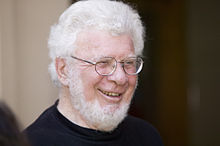Leonard Herzenberg | |
|---|---|
 Herzenberg in 2006 | |
| Born | Leonard Arthur Herzenberg November 5, 1931 New York City, US |
| Died | October 27, 2013 (aged 81) |
| Alma mater | Brooklyn College California Institute of Technology |
| Known for | Flow cytometry (FACS)[2] |
| Spouse | Leonore Herzenberg[3] |
| Children | 4, including Jana |
| Awards | Kyoto Prize (2006) |
| Scientific career | |
| Fields | Immunology, genetics |
| Institutions | Stanford University Pasteur Institute |
| Thesis | Studies on a Cytochrome Destroying System in Neurospora (1956) |
| Doctoral advisor | Herschel K. Mitchell[1] |
Leonard Arthur "Len" Herzenberg (November 5, 1931 – October 27, 2013) was an immunologist, geneticist and professor at Stanford University. His contributions to the development of cell biology made it possible to sort viable cells by their specific properties.[3][4][5][6][7][8]
- ^ Herzenberg, Leonard (1956). Studies on a cytochrome destroying system in Neurospora (PhD thesis). California Institute of Technology.
- ^ Herzenberg, L. A.; Parks, D.; Sahaf, B.; Perez, O.; Roederer, M.; Herzenberg, L. A. (2002). "The history and future of the fluorescence activated cell sorter and flow cytometry: A view from Stanford". Clinical Chemistry. 48 (10): 1819–1827. doi:10.1093/clinchem/48.10.1819. PMID 12324512.
- ^ a b Herzenberg, Leonard A.; Herzenberg, Leonore A.; Roederer, M. (2013). "A Conversation with Leonard and Leonore Herzenberg". Annual Review of Physiology. 76: 130819115335001. doi:10.1146/annurev-physiol-021113-170355. PMID 23957332.
- ^ Roederer, M. (2013). "Leonard Herzenberg (1931–2013) Immunologist who pioneered cell-sorting technology". Nature. 504 (7478): 34. doi:10.1038/504034a. PMID 24305144.
- ^ Leonard Herzenberg's publications indexed by the Scopus bibliographic database. (subscription required)
- ^ Roederer, Mario (October 28, 2013). "Len Herzenberg - 1931-2013". Purdue University Cytometry Laboratories. Retrieved October 29, 2013.
- ^ "The History of the Cell Sorter Interviews". Record Unit 9554. Smithsonian Institution Archives. Retrieved 9 March 2012.
- ^ Kalte, Pam M.; Nemeh, Katherine H.; and Schusterbauer, Noah (2005) "Herzenberg, Leonard Arthur (1931-)" American Men & Women of Science: A biographical directory of today's leaders in physical, biological and related sciences (22nd ed.)Thomson Gale, Detroit;